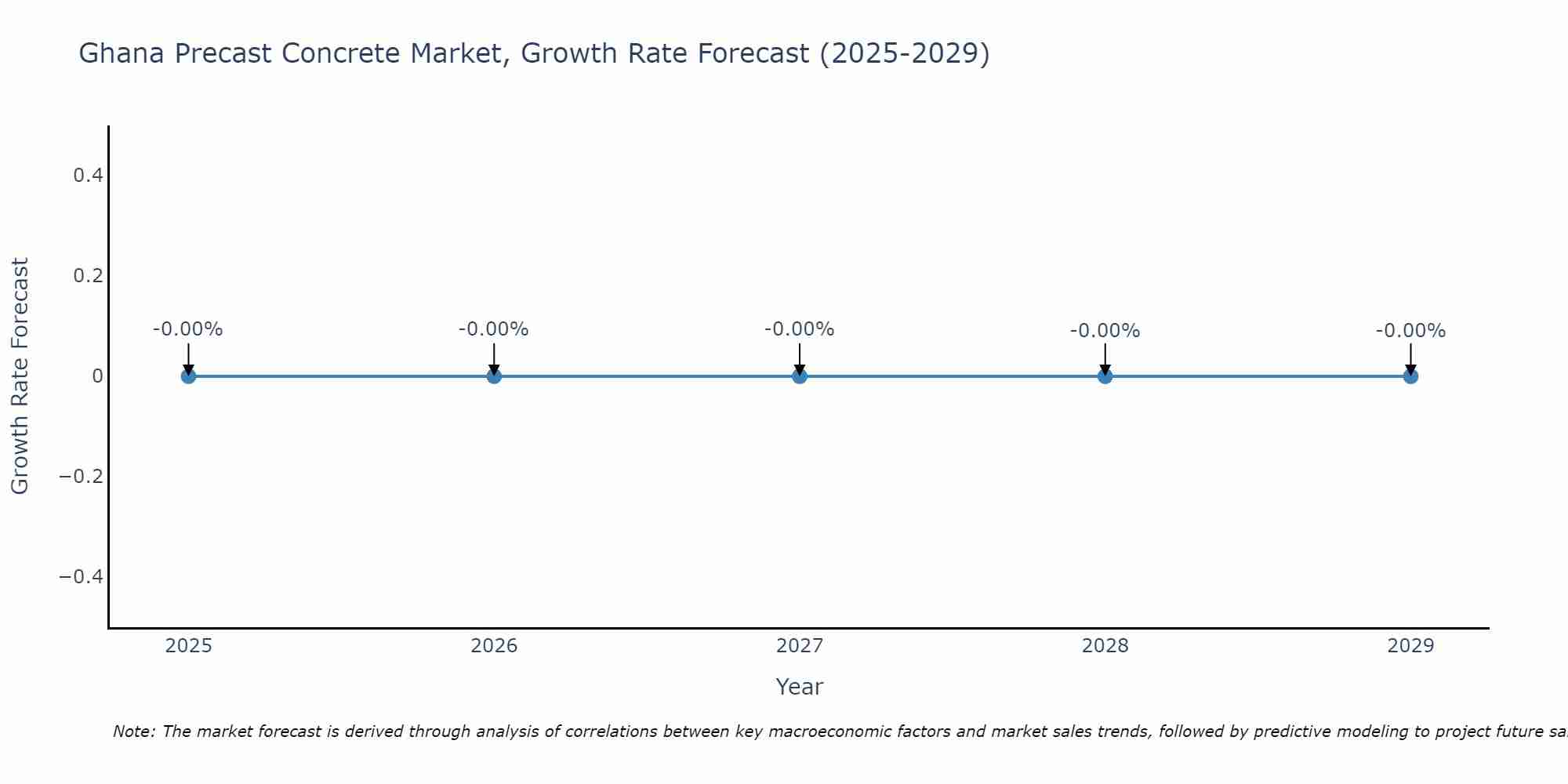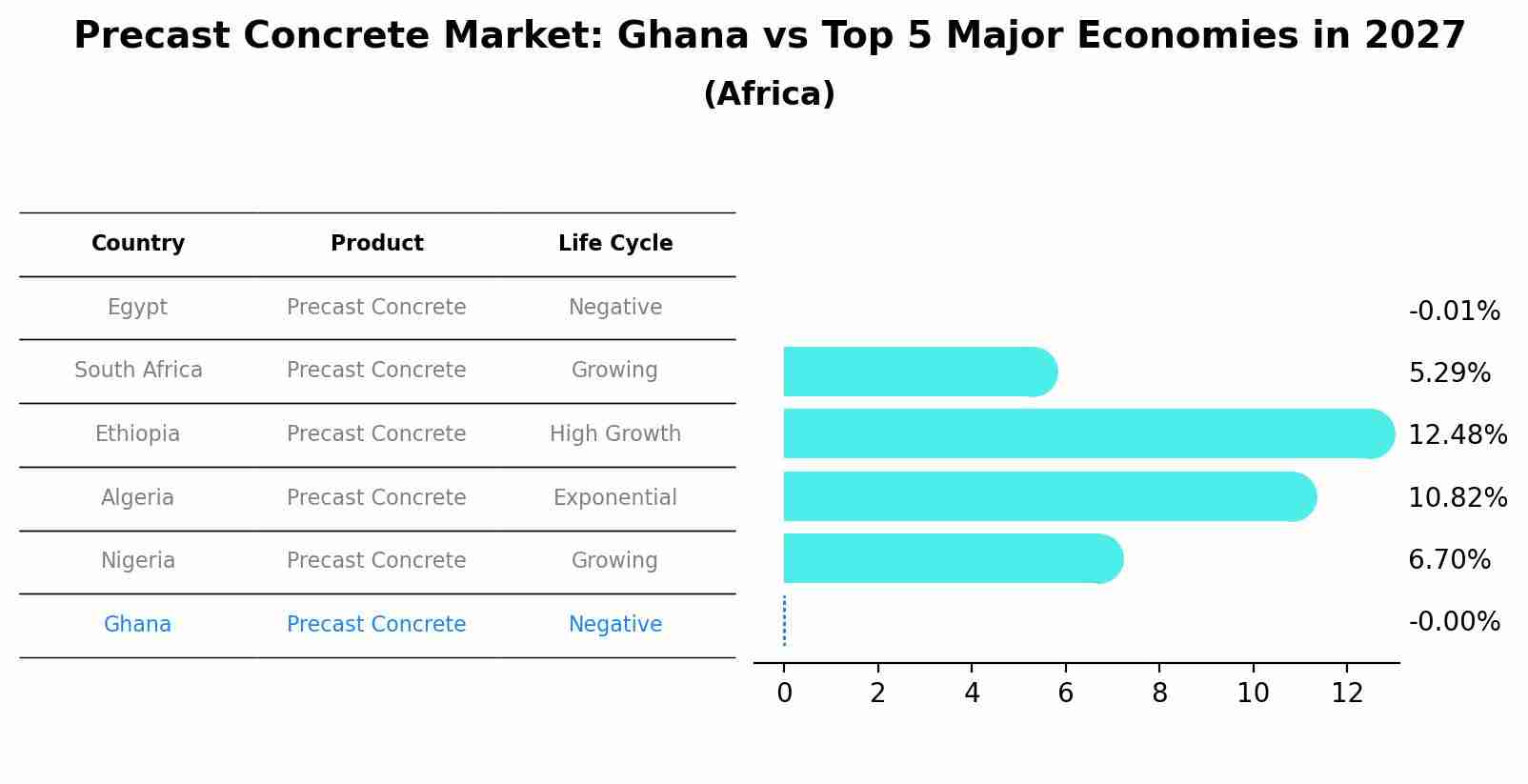Ghana Precast Concrete Market (2025-2031) Outlook | Size, Industry, Value, Revenue, Growth, Analysis, Companies, Forecast, Share & Trends
| Product Code: ETC372896 | Publication Date: Aug 2022 | Updated Date: Jul 2025 | Product Type: Market Research Report | |
| Publisher: 6Wresearch | Author: Sachin Kumar Rai | No. of Pages: 75 | No. of Figures: 35 | No. of Tables: 20 |
Ghana Precast Concrete Market Size Growth Rate
The Ghana Precast Concrete Market could see a tapering of growth rates over 2025 to 2029. Although the growth rate starts strong at -0.00% in 2025, it steadily loses momentum, ending at -0.00% by 2029.

Precast Concrete Market: Ghana vs Top 5 Major Economies in 2027 (Africa)
In the Africa region, the Precast Concrete market in Ghana is projected to expand at a negative growth rate of -0.00% by 2027. The largest economy is Egypt, followed by South Africa, Ethiopia, Algeria and Nigeria.

Ghana Precast Concrete Market Synopsis
The Ghana precast concrete market is experiencing steady growth due to increasing construction activities in the country. Precast concrete products such as walls, slabs, beams, and columns are being widely used in various construction projects including residential, commercial, and infrastructure developments. The demand for precast concrete is driven by its numerous advantages such as cost-effectiveness, durability, and faster construction compared to traditional methods. Key players in the Ghana precast concrete market are focusing on expanding their product offerings, improving quality standards, and enhancing production capabilities to meet the growing demand. Additionally, government initiatives to support the construction sector and the adoption of sustainable building materials are further driving the growth of the precast concrete market in Ghana.
Ghana Precast Concrete Market Trends
The Ghana precast concrete market is experiencing significant growth driven by the increasing demand for affordable housing and infrastructure development projects in the country. The trend towards sustainable construction practices and the need for quicker and cost-effective building solutions are also fueling the adoption of precast concrete products. Additionally, the government`s focus on promoting local manufacturing industries is boosting the production and use of precast concrete in the construction sector. Key players in the market are investing in new technologies and product innovations to meet the evolving needs of the construction industry. Overall, the Ghana precast concrete market is poised for continued expansion as stakeholders recognize the benefits of precast concrete in terms of quality, durability, and efficiency in construction projects.
Ghana Precast Concrete Market Challenges
In the Ghana precast concrete market, some key challenges include limited awareness and understanding of the benefits of precast concrete construction among stakeholders, such as developers, contractors, and government entities. This lack of awareness often leads to resistance to adopt precast concrete solutions, hindering the market`s growth potential. Additionally, the high initial investment required for setting up precast concrete manufacturing facilities and the need for skilled labor to produce high-quality precast components pose significant challenges. Furthermore, inconsistent quality standards and regulatory frameworks in the construction industry also create barriers to the widespread adoption of precast concrete in Ghana. Overcoming these challenges would require targeted educational campaigns, investment in training programs, and the establishment of clear quality control measures to enhance the market`s competitiveness and sustainability.
Ghana Precast Concrete Market Investment Opportunities
Investment opportunities in the Ghana precast concrete market are promising due to the country`s growing construction industry and increasing demand for affordable and sustainable building materials. Potential areas for investment include precast concrete production facilities to supply the construction sector with high-quality, cost-effective building components such as walls, slabs, and beams. Additionally, there is a rising need for precast concrete products in infrastructure projects like roads, bridges, and drainage systems, presenting opportunities for investors to cater to these segments. Collaborating with developers, contractors, and government agencies to provide innovative precast concrete solutions can also be a lucrative investment avenue in Ghana`s evolving construction landscape. Overall, investing in the Ghana precast concrete market offers the potential for long-term growth and profitability as the construction industry continues to expand.
Jordan Agar Market Government Policies
The Ghanaian government has implemented various policies to support the growth of the precast concrete market in the country. These policies include the promotion of affordable housing through initiatives such as the National Housing Policy and the Affordable Housing Project. Additionally, the government has emphasized the use of precast concrete in infrastructure development projects to enhance efficiency and quality. The introduction of Building Code Regulations and Standards for the construction industry also plays a crucial role in ensuring the safety and durability of precast concrete structures. Furthermore, the government has been actively involved in promoting sustainable construction practices, which align with the use of precast concrete technology to reduce environmental impact. Overall, these policies aim to drive innovation, improve construction practices, and stimulate growth in the Ghana precast concrete market.
Ghana Precast Concrete Market Future Outlook
The Ghana precast concrete market is expected to show significant growth in the coming years due to increasing infrastructure development projects, urbanization, and the government`s focus on affordable housing initiatives. The demand for precast concrete products such as beams, columns, and slabs is projected to rise as they offer cost-effective, sustainable, and time-saving solutions for construction projects. Additionally, the growing awareness about the benefits of precast concrete, including durability, quality control, and reduced construction time, is likely to drive market expansion. With advancements in technology and the adoption of innovative manufacturing processes, the Ghana precast concrete market is poised for steady growth and opportunities for industry players to capitalize on the burgeoning construction sector in the country.
Key Highlights of the Report:
- Ghana Precast Concrete Market Outlook
- Market Size of Ghana Precast Concrete Market, 2024
- Forecast of Ghana Precast Concrete Market, 2031
- Historical Data and Forecast of Ghana Precast Concrete Revenues & Volume for the Period 2021 - 2031
- Ghana Precast Concrete Market Trend Evolution
- Ghana Precast Concrete Market Drivers and Challenges
- Ghana Precast Concrete Price Trends
- Ghana Precast Concrete Porter's Five Forces
- Ghana Precast Concrete Industry Life Cycle
- Historical Data and Forecast of Ghana Precast Concrete Market Revenues & Volume By Product for the Period 2021 - 2031
- Historical Data and Forecast of Ghana Precast Concrete Market Revenues & Volume By Structural Building Components for the Period 2021 - 2031
- Historical Data and Forecast of Ghana Precast Concrete Market Revenues & Volume By Architectural Building Components for the Period 2021 - 2031
- Historical Data and Forecast of Ghana Precast Concrete Market Revenues & Volume By Transportation Products for the Period 2021 - 2031
- Historical Data and Forecast of Ghana Precast Concrete Market Revenues & Volume By Water & Waste Handling Products for the Period 2021 - 2031
- Historical Data and Forecast of Ghana Precast Concrete Market Revenues & Volume By Others for the Period 2021 - 2031
- Historical Data and Forecast of Ghana Precast Concrete Market Revenues & Volume By End-use for the Period 2021 - 2031
- Historical Data and Forecast of Ghana Precast Concrete Market Revenues & Volume By Residential for the Period 2021 - 2031
- Historical Data and Forecast of Ghana Precast Concrete Market Revenues & Volume By Non-residential for the Period 2021 - 2031
- Historical Data and Forecast of Ghana Precast Concrete Market Revenues & Volume By Infrastructure for the Period 2021 - 2031
- Ghana Precast Concrete Import Export Trade Statistics
- Market Opportunity Assessment By Product
- Market Opportunity Assessment By End-use
- Ghana Precast Concrete Top Companies Market Share
- Ghana Precast Concrete Competitive Benchmarking By Technical and Operational Parameters
- Ghana Precast Concrete Company Profiles
- Ghana Precast Concrete Key Strategic Recommendations
Frequently Asked Questions About the Market Study (FAQs):
- Single User License$ 1,995
- Department License$ 2,400
- Site License$ 3,120
- Global License$ 3,795
Search
Related Reports
- Europe Flooring Market (2025-2031) | Outlook, Share, Industry, Trends, Forecast, Companies, Revenue, Size, Analysis, Growth & Value
- Saudi Arabia Manlift Market (2025-2031) | Outlook, Size, Growth, Trends, Companies, Industry, Revenue, Value, Share, Forecast & Analysis
- Uganda Excavator, Crane, and Wheel Loaders Market (2025-2031) | Strategy, Consumer Insights, Analysis, Investment Trends, Opportunities, Growth, Size, Share, Industry, Revenue, Segments, Value, Segmentation, Supply, Forecast, Restraints, Outlook, Competition, Drivers, Trends, Demand, Pricing Analysis, Competitive, Strategic Insights, Companies, Challenges
- Rwanda Excavator, Crane, and Wheel Loaders Market (2025-2031) | Strategy, Consumer Insights, Analysis, Investment Trends, Opportunities, Growth, Size, Share, Industry, Revenue, Segments, Value, Segmentation, Supply, Forecast, Restraints, Outlook, Competition, Drivers, Trends, Demand, Pricing Analysis, Competitive, Strategic Insights, Companies, Challenges
- Kenya Excavator, Crane, and Wheel Loaders Market (2025-2031) | Strategy, Consumer Insights, Analysis, Investment Trends, Opportunities, Growth, Size, Share, Industry, Revenue, Segments, Value, Segmentation, Supply, Forecast, Restraints, Outlook, Competition, Drivers, Trends, Demand, Pricing Analysis, Competitive, Strategic Insights, Companies, Challenges
- Angola Excavator, Crane, and Wheel Loaders Market (2025-2031) | Strategy, Consumer Insights, Analysis, Investment Trends, Opportunities, Growth, Size, Share, Industry, Revenue, Segments, Value, Segmentation, Supply, Forecast, Restraints, Outlook, Competition, Drivers, Trends, Demand, Pricing Analysis, Competitive, Strategic Insights, Companies, Challenges
- Israel Intelligent Transport System Market (2025-2031) | Strategy, Consumer Insights, Analysis, Investment Trends, Opportunities, Growth, Size, Share, Industry, Revenue, Segments, Value, Segmentation, Supply, Forecast, Restraints, Outlook, Competition, Drivers, Trends, Demand, Pricing Analysis, Competitive, Strategic Insights, Companies, Challenges
- Uganda Precast and Aggregate Market (2025-2031) | Strategy, Consumer Insights, Analysis, Investment Trends, Opportunities, Growth, Size, Share, Industry, Revenue, Segments, Value, Segmentation, Supply, Forecast, Restraints, Outlook, Competition, Drivers, Trends, Demand, Pricing Analysis, Competitive, Strategic Insights, Companies, Challenges
- Australia IT Asset Disposal Market (2025-2031) | Strategy, Consumer Insights, Analysis, Investment Trends, Opportunities, Growth, Size, Share, Industry, Revenue, Segments, Value, Segmentation, Supply, Forecast, Restraints, Outlook, Competition, Drivers, Trends, Demand, Pricing Analysis, Competitive, Strategic Insights, Companies, Challenges
- UAE Building Thermal Insulation Market Outlook (2025-2031) | Revenue, Companies, Share, Trends, Growth, Size, Forecast, Industry, Analysis & Value
Industry Events and Analyst Meet
Our Clients
Whitepaper
- Middle East & Africa Commercial Security Market Click here to view more.
- Middle East & Africa Fire Safety Systems & Equipment Market Click here to view more.
- GCC Drone Market Click here to view more.
- Middle East Lighting Fixture Market Click here to view more.
- GCC Physical & Perimeter Security Market Click here to view more.
6WResearch In News
- Doha a strategic location for EV manufacturing hub: IPA Qatar
- Demand for luxury TVs surging in the GCC, says Samsung
- Empowering Growth: The Thriving Journey of Bangladesh’s Cable Industry
- Demand for luxury TVs surging in the GCC, says Samsung
- Video call with a traditional healer? Once unthinkable, it’s now common in South Africa
- Intelligent Buildings To Smooth GCC’s Path To Net Zero













